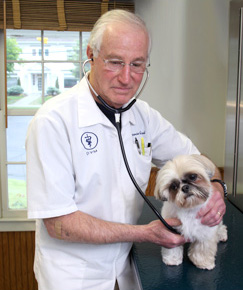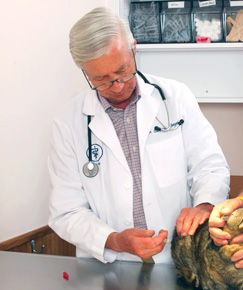Veterinary Wellness Exams
The foundation of your pet's health is the thorough practice of preventative care, which includes a complete physical examination at least once each year. During your pet's wellness checkup, Schulhof Animal Hospital doctors will:

Listen to your pet's heart – Early signs of cardiac disease such as heart murmurs and abnormal heart beat patterns known as arrhythmias can be heard through a stethoscope. Discovering these initial indicators of trouble ahead can lead to identifying and treating the underlying condition before it becomes a more serious health threat. If serious arrhythmias are detected, we can do an electrocardiogram to determine the extent of the problem. We may also take your pet's blood pressure using either a pressure cuff or Doppler device, and/or an ultrasound.
Listen to your pet's lungs – Health issues such as infections, obstructive diseases and other problems can also be detected by listening to your pet's lungs. The doctor can also assess the overall pulmonary health of your pet. If lung sounds do not seem to be normal, a chest x-ray can be taken to determine if there is pathology.
Check your pet's teeth and oral cavity – Examining your pet's teeth and mouth is an important part of preventing dental disease, which is one of the most common health concerns in pets. Very young animals, such as kittens and puppies, also need to be checked to ensure they are developing an appropriate bite and that they are losing their baby teeth at the right time. We also take the time to discuss proper home dental care with you.
Evaluate your pet's vision – All diseases follow relatively predictable processes and if found early can be more easily treated. Ocular conditions, which can also be prevented through regular care and screenings, are no exception. We can also test ocular pressure with a tonometer to assess risk for glaucoma.
Look into your pet's ears – As with dental disease, ear disease is relatively common in many types of pets. Issues such as low-grade allergies, funguses, reactions to certain foods, mites and other parasites can all cause and contribute to otitis or ear disease. Though you may feel this is an area that can be well-handled at home, the fact is that many ear diseases are difficult to detect and require medical treatment.
Palpate the lymph nodes, abdomen and skin – By feeling the skin and body, we are looking for unusual lumps or swellings as well as evaluating for skin discolorations, lesions or patterns of hair loss or thinning. These can indicate the presence of more systemic problems, especially metabolic diseases and cancer, which most commonly occur in middle-aged animals, but can occur in young animals as well.
Palpate joints and muscles – By examining the joints, legs and other areas of the body, we are able to evaluate for swelling, decreased muscle tone and variations in muscle size between the legs. We also observe your pet's gait for developmental issues. In puppies, we look for early indications of hip or elbow problems. For older pets, we look for signs of arthritis, which can be well-treated if found early.
Lab work – A complete physical includes a heartworm test, fecal flotation test for intestinal parasites, urine analysis, and a red blood cell count as anemia (decrease in the number of red blood cells) can indicate the presence of a number of disease processes. For pets six years of age or older, we also perform a complete blood cell count and a chemistry profile in order to create a baseline of systemic health and to detect any emergent disease processes.
A Balanced Vaccination Protocol for Your Pet

Vaccines have long proven their effectiveness at preventing diseases that would otherwise be fatal to our pets. However, the veterinarians at Schulhof Animal Hospital believe that a well-balanced approach to the care of your pet should include the proper vaccines for your pet's lifestyle, no less or no more.
The key to reducing the number and amount of vaccines is through a process known as vaccine titering. Essentially, this involves testing a small amount of blood for the presence of antibodies to specific diseases. If the levels are satisfactory to prevent disease, then your pet should not require an additional vaccine.
In general, we provide mature dogs with a rabies and DHPP vaccine every three years. Cats receive rabies vaccine every year and FVRCP every three years. We vaccinate dogs for Lyme disease each year, but only if they test negative for the disease. We also vaccinate dogs against Bordetella (Kennel Cough) once a year if they board or visit dog parks. Feline Leukemia vaccine is given only to outdoor cats and per request for indoor cats. Leptospirosis vaccine is given only to dogs at risk of exposure. We also have canine flu vaccine available.
Puppy and Kitten Care
Puppies and Kittens are a lot of fun to have in the home, but they require some special attention in order to assure they are happy and healthy companions for years to come. Comprehensive physical exams at key developmental stages are important. This is also the time to screen for and treat damaging parasitic infections such as worms or giardia.
Because we take a holistic approach to the care of your puppy or kitten, Schulhof Animal Hospital spreads out vaccine visits. After each vaccine, antibodies take time to build up and we want to make sure your new pet's immune system adequately responds and recovers from each vaccination challenge. We offer puppy and kitten well-care packages for the first six months of life to make sure all the important things are taken care of, and to give you plenty of visits to provide you with opportunities to ask all the questions that come to mind regarding your pet's care.
